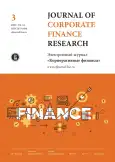Assessment of Influence of External Factors on Financial Stability of Construction Companies
- Authors: Vlasenko M.
- Issue: Vol 14, No 3 (2020)
- Pages: 51-62
- Section: New Research
- URL: https://bakhtiniada.ru/2073-0438/article/view/303134
- DOI: https://doi.org/10.17323/j.jcfr.2073-0438.14.3.2020.51-62
- ID: 303134
Cite item
Full Text
Abstract
When Russian construction companies switch to project financing they face a number of problems which have a negative impact on their operations. While a company is able to influence internal factors (such as resources, capital, their utilization efficiency etc.) it is virtually impossible to control external factors (inflation, unemployment, government policy etc.). These factors make a company less stable financially. One of manifestations of financial stability is resistance to external environmental disturbances. External factors influence corporate financial stability, they are mortgage rate, price increase index etc. Defining the extent of influence of external factors will help to mitigate the impact of external environment, alleviate the consequences. This makes the topic of the research relevant and increases the significance of analysis of external factors which influence corporate operations.
In this paper we conducted content analysis of the financial stability definition; evaluated financial stability of 50 construction companies of the Siberian Federal District; selected statistical information by constituent entities of the Siberian Federal District which influences construction companies’ operations; assessed influence of the selected factors on financial stability of construction companies applying the binary choice model (logit model). The research showed that mortgage rate, consumer price index and nominal average salary influence construction companies of the Siberian Federal District. If influence of these factors is taken into consideration when planning and managing construction companies’ resources they will be able to resist the impact of external environment and improve their financial stability.
References
- Kovalev V. V. Financial management: theory and practice. Moscow: TK Velbi; Prospekt; 2008. 1024 p. (In Russ.).
- Boronenkova S. A., Mel'nik M. V. Comprehensive financial analysis in enterprise management. Moscow: FORUM; INFRA-M; 2017. 335 p. (In Russ.).
- Savitskaya G. V. Comprehensive analysis of the economic activities of the enterprise. Moscow: INFRA-M; 2017. 608 p. (In Russ.).
- Vladimirova T. A., Sokolova T. V. Financial stability of the organization: Essence, content, approaches to assessment. Sibirskaya finansovaya shkola = Siberian Financial School. 2017;(5):44-47. (In Russ.).
- Schinasi G. J. Defining financial stability. IMF Working Paper. 2004;(187). URL: https://www.imf.org/external/pubs/ft/wp/2004/wp04187.pdf.
- Pera J. An enterprise's financial stability and its sustainable growth: A risk-based perspective. Przedsiębiorczość Międzynarodowa = International Entrepreneurship. 2017;3(2):49-62. doi: 10.15678/PM.2017.0302.04.
- Fayantzeva E. Yu. The risk of reducing the financial stability of the enterprise in modern conditions. Effektivnoe antikrizisnoe upravlenie = Effective Crisis Management. 2014;(3):84-89. (In Russ.).
- Vlasenko M. A., Baranova I. V. Managing financial stability in a turbulent environment. In: Economic and social development. Proc. 47th Int. sci. conf. on economic and social development (Prague, 14-15 Nov. 2019). Varazdin: Varazdin Development and Entrepreneurship Agency; 2019:401-409. URL: https://www.esd-conference.com/upload/book%20of%20proceedings/Book%20of%20Proceedings%20esdPrague2019%20Online.pdf.
- Khalikov M. A., Nikiforova M. A. Economic efficiency and risk of the structure of the working capital of the enterprise. Fundamental'nye issledovaniya = Fundamental Research. 2018;(6):222-228. (In Russ.).
- Mazeed S. A., Rani P. S., Raveendranath R., Divya P., Sudharani T. Effectiveness of capital structure on profitability - IT companies perspective. International Journal of Innovative Technology and Exploring Engineering. 2019;9(1):726-728. doi: 10.35940/ijitee.A4204.119119.
- Vu T., Le T., Nguyen T. The impact of capital structure on the performance of construction companies: A study from Vietnam stock exchanges. Accounting. 2020;6(2):169-176. doi: 10.5267/j.ac.2019.10.006.
- Vlasenko M. A., Baranova I. V. Improving the tools for financial analysis of construction organizations: An industry aspect. Vestnik Tomskogo gosudarstvennogo universiteta. Ekonomika = Tomsk State University. Journal of Economics. 2019;(45):174-185. (In Russ.). doi: 10.17223/19988648/45/12.
- Huang Q., Kim R. Capital structure decisions along the supply chain: Evidence from import competition. Journal of International Business Studies. 2019;50(6):873-894. doi: 10.1057/s41267-019-00225-9.
- Granville B., Matousek R., Sokolov E. The impact of economic policy uncertainty on capital structure: Evidence from Russia. Korporativnye finansy = Journal of Corporate Finance Research. 2019;13(4):7-19. doi: 10.17323/j.jcfr.2073-0438.13.4.2019.7-19.
- Will a self-regulatory organization protect builders: On the consequences of the shared construction reform for the Novosibirsk construction market and the role of SROs. NGS.ru. Sept. 11, 2018. URL: https://news.ngs.ru/articles/65369291/ (accessed 14.09.2019). (In Russ.).
- Putin spoke about the new program of preferential mortgages. RIA Novosti. Apr. 16, 2020. URL: https://realty.ria.ru/20200416/1570157234.html?utm_source=yxnews&utm_medium=desktop&utm_referrer=https%3A%2F%2Fyandex.ru%2Fnews (accessed 17.04.2020). (In Russ.).
- Thabhiranrak T., Jermsittiparsert K. Towards sustainable functioning of organization: Women empowerment and corporate management culture. Journal of Security and Sustainability Issues. 2019;9(1):321-332. doi: 10.9770/jssi.2019.9.1(24).
- An Z., Li D., Yu J. Earnings management, capital structure, and the role of institutional environments. Journal of Banking & Finance. 2016;68:131-152. doi: 10.1016/j.jbankfin.2016.02.007.
- The Central Bank thought about cutting the key rate. RIA Novosti. Apr. 17, 2020. URL: https://ria.ru/20200417/1570176547.html?utm_source=yxnews&utm_medium=desktop&utm_referrer=https%3A%2F%2Fyandex.ru%2Fnews (accessed 10.04.2020). (In Russ.).
Supplementary files










